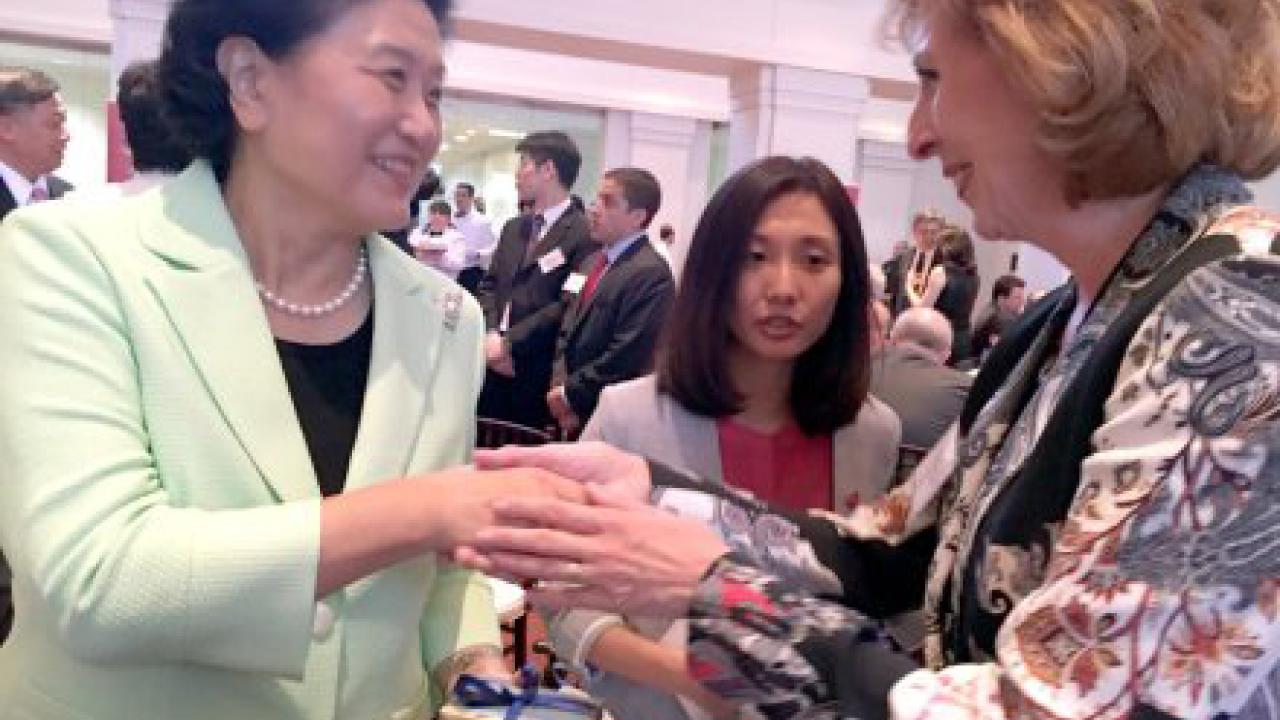UC Davis has a number of vital collaborations with university and industry partners in China, and the recent U.S.-China University Presidents Roundtable in Houston provided opportunities to pursue more mutually beneficial alliances.
The one-day event, bringing together 50 university leaders from the United States and China, was co-sponsored by Rice University and the China Scholarship Council, a government agency.
In just one of the many recent examples of our enhanced relationships in China, the CSC now provides financial support for 20 Chinese graduate students pursuing doctoral degrees on our campus.
When I arrived at the conference dinner held Sunday, June 21, I was honored to be seated at the same table as China’s Vice Premier Liu Yandong, one of the country’s highest-ranking government officials. We had a chance to talk about issues of common concern such as global education, research collaborations and work that our World Food Center is doing to help establish the Sino-U.S. Research Center for Food Safety in China.
Speaking to the vice premier also gave me an opportunity to deliver a letter I wrote to China’s President Xi Jinping, inviting him and his wife to visit UC Davis the next time they are in the United States. I am optimistic he will take us up on the invitation sometime in the not-too-distant future.
The Chinese president has a connection to UC Davis dating back to 1992, when he was a regional government official. In that capacity he arranged for the widow of Milton Gardner, one of the three original faculty members in our department of physics when it was created in 1953, to visit the small Chinese village where her husband was born.
As I wrote in my letter to now-President Xi, “Your compassion and sensitivity in assisting Elizabeth Gardner to fulfill her husband’s last wish by visiting his childhood home of Guling will always connect you with our university in a unique and personal way.”
At the roundtable in Houston, Vice Premier Liu spoke about the value of interpersonal relationships and how they can help influence events on the world stage.
“I believe that universities are pioneers for people-to-people exchange between our two countries, and also the binding force for China-U.S. relations,” she said in her keynote address.
UC Davis is doing its part, and we want to do even more in the future. Among other things, we have been invited to possibly collaborate with Zhejiang University on the food, science and technology component of its plans to develop a new comprehensive international campus in Haining.
Zhejiang University is already one of our strongest partners in China. Hundreds of its top students have come to UC Davis in recent years to gain research training with our faculty in cutting-edge science and technology fields.
In addition to bolstering relations between our two nations, these collaborations advance UC Davis’ goal of becoming a global university.
With the world’s economy more interconnected all the time, we need to make sure UC Davis students get the exposure and experience to compete in the global marketplace of ideas and commerce.
UC Davis is held in extremely high regard in China. This is evident in growing numbers of applications from top-flight Chinese graduate students, even as other universities have seen a drop in applications from China.
As our stature there continues to grow, it helps ensure that the Chinese students who apply are among the best-qualified, consistent with UC Davis’ high academic standards.
As she finished her keynote address, Vice Premier Liu summed up some of the long-term benefits from greater collaborations between schools like UC Davis and peers in China.
“For many of the problems confronting mankind today, we find answers through dialogue, interactions and cooperation among various civilizations,” she said. “Universities are resourceful in knowledge and culture. They are where different ideas and cultures meet and merge with each other. Universities act as pioneers for human progress.”
I could not agree more and look forward to strengthening our ties with universities and industry in China and elsewhere that benefit the UC Davis community and people here and around the world.
Media Resources
Dave Jones, Dateline, 530-752-6556, dljones@ucdavis.edu
